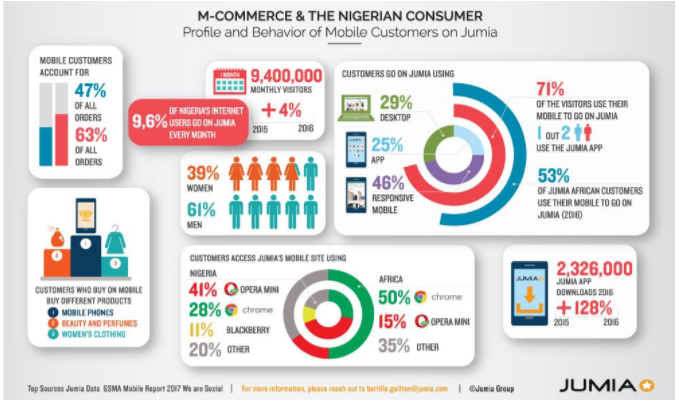Widely accepted as Nigeria’s number one retailer, Jumia offers a wide range of products from groceries, to apparel and electronics. The eCommerce company delivers to all of Nigeria’s 36 states and operates in additional countries such as Egypt, Kenya, Uganda and Morocco.
Established in 2012, Jumia has rapidly grown from a 3-person office to a corporation, employing over 1,000 people (including 150 customer service representatives, available 7 days a week). Jumia has established itself as “the Amazon” of Nigeria by allowing Africans the flexibility to make purchases online from anywhere and via any device.
But how did Jumia achieve this great success in such a short time?
Key lessons to be learned from Jumia
Jumia identified a market opportunity, and strove to effectively fill the need. It began with a small team and huge plans. It raised smart investment to fund the first crucial years of market penetration, facilitating operation scale up and growth. The company established important strategic partnerships in its market, such as with telecom companies, and researched its market in order to best answer the needs and concerns of its clientele.
For instance, Jumia created its own logistical infrastructure, getting control over one of the most serious causes for concern within the market it operates. It also began to educate consumers in order to lower reservations regarding online payments and fraud.
Jumia built online and offline payment processes which answered the needs of its clients. Its online payment option utilizes a 3-step secure process enabling its online customers to confidently use their preferred payment method. With over 9 million visitors monthly, over 53% of its African customers opting for mobile shopping, and penetration of close to 10% within Nigeria’s online community, Jumia’s results reflect the steps it took when targeting this challenging market.
The following are a few key lessons ecommerce companies can learn from Jumia’s corporate development and strategic planning:
Identify a demand-driven niche
As with any startup, a new online company must ascertain that it has a viable market, and that its solution answers its target market’s needs. Do your homework, and learn your market. Identify the market opportunity, and build a team that has the collective capabilities for this crucial stage in the corporate development process. Define development and marketing milestones, and establish success criteria. Compile a list of challenges, and create a plan to meet them head-on. Assemble the market research, development plan and milestone goals into a business plan, and ensure its execution.
Effectively connect with your customer base
As part of the above market research process, be sure to delve further into the needs and concerns of your customer base. Establish an in-depth and holistic understanding of your customers and market segments. Ensure that your platform provides value to your target customers. Address the concerns you have uncovered within your solution, thereby increasing your chances of success.
Educate your customers as to the benefits of your solution, as well as regarding the benefits of moving to an online service (or goods) provider. Stress your strengths, such as high quality, fast service, exemplary availability, and online efficiencies. Make sure that your customers understand the steps you have taken to ensure their security.
Establish an active social media presence in order to effectively connect with your customers.
Define a service level agreement, and be sure to uphold the goals you have set for service provision. Track your success in reaching your customers through the different channels you have implemented, making changes as necessary based on performance results.
Grow your company via investments
In order to fund the startup period, businesses require funding. A successful online company, with plans to scale up and grow, must raise the capital it needs to finance the resources required for this growth.
New ventures should scout for investors and venture capital firms who are active in their target geographies and industries. Look into their investment histories. Be sure they are currently active, and that they have the capital on hand to invest in your enterprise. Selectively reach out to the investors and VCs which will bring you the most value, not only in terms of capital raised, but also in terms of market experience and reputation. Smart investments will help build your credibility in dealings with strategic partners and your customer base.
Implement secure online payment methods
Online business must offer secure payment options to protect user data, as is required by internationally accepted standards such as PCI DSS. In Africa it is important to accept a variety of payment options, such as international and local credit cards, mobile money, digital currencies, and mobile wallets.
In order to provide a secure, fast and easy payment process for customers, businesses should use a payment service provider (PSP), such as Direct Pay Online. Direct Pay Online offers PCI DSS Level 1 protection, the highest level of protection available, can enable you to accept a wide variety of currencies, and its various ecommerce payment options can be integrated seamlessly into online retail and service sites. Direct Pay Online offers a flexible and secure solution to companies targeting the African online retail and service market.







